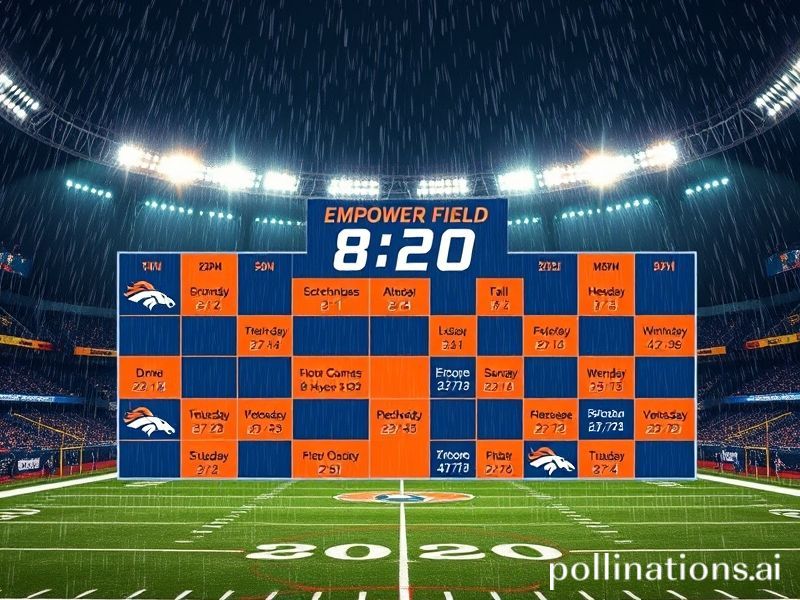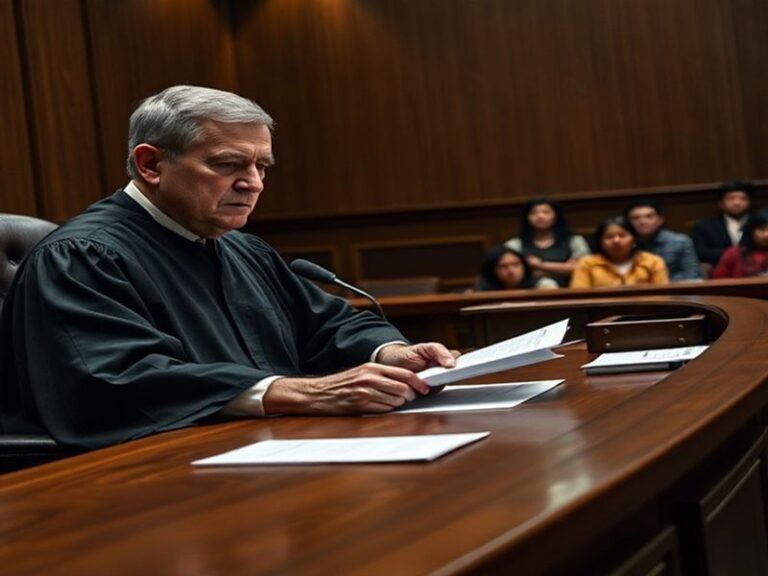Global Gridiron: How the Broncos Schedule Quietly Rules a World on Fire
In a world where grain freighters reroute around the Red Sea to avoid drone hobbyists and the Arctic Council meets via Zoom because the polar ice has melted too much for a physical quorum, the Denver Broncos’ freshly released 2024 schedule lands on my desk like a glossy brochure from a saner planet. It promises autumn Sundays, mile-high sunsets, and the comforting illusion that the worst thing that can happen to humanity is a 3rd-and-long draw play. Spoiler: it isn’t.
Consider the international implications. The Broncos will face the Saints in London on October 13, a game conveniently scheduled for 2:30 p.m. local time so that American insomniacs and British pub-goers can simultaneously question why Sean Payton keeps calling screen passes. The NFL’s transatlantic flirtation has all the subtlety of a tourist wearing socks with sandals: profitable, slightly embarrassing, and inevitably leading to someone asking where to find the nearest Taco Bell. The league insists this is “growing the game,” which is corporate-speak for “finding new markets to sell $180 color-rush hoodies before Europe’s energy bills make discretionary polyester morally indefensible.”
Elsewhere on the calendar, the Broncos host the Jets in Week 5, a clash whose global resonance lies mainly in reminding the rest of the planet that even wealthy democracies can mismanage assets for decades without consequence. Aaron Rodgers—older than TikTok and twice as volatile—will presumably hobble into Denver on a surgically rebuilt Achilles, proving that American medicine can indeed reassemble a quarterback but can’t patch a polar vortex. Speaking of climate, the late-December tilt in Kansas City is slated for freezing rain, a meteorological gift from a planet that has decided football weather is best experienced as an existential dare. Somewhere in Bonn, a climate negotiator will watch Patrick Mahomes throw a no-look pass while icicles form on his eyelashes and quietly delete the phrase “adaptation funding” from the COP agenda.
For the connoisseurs of geopolitical irony, note the Week 11 bye. The Broncos will sit idle the same weekend the Asia-Pacific Economic Cooperation summit meets in Lima, allowing Russell Wilson to contemplate Peruvian trade balances while linebackers contemplate their mortality. Both events involve grown men in expensive suits arguing over who gets the last shrimp, but only one ends with someone tearing an ACL.
The schedule’s pièce de résistance is the Christmas Day game against the Colts, a yuletide tradition as heartwarming as a drone strike on Santa’s sleigh. International viewers tuning in from time zones where December 25 is already Boxing Day will witness the spectacle of American families pretending to enjoy football while Grandma passive-aggressively notes that the figgy pudding is getting cold. Somewhere in Gaza, a power cut will flicker just as the extra point is up, sparing viewers the existential dread of realizing they missed a Colts-Broncos overtime thriller for the price of a barrel of Brent crude.
What does it all mean? In a year when elections from New Delhi to Novosibirsk feel like reality-TV spin-offs and the oceans are busy renegotiating coastlines without consulting zoning boards, the Broncos’ schedule offers the global citizen a rare constant: 17 weeks of choreographed violence, fantasy-league neuroses, and the comfort of knowing that somewhere, someone is still arguing about whether running backs matter. It’s not quite world peace, but it’s cheaper than therapy and pairs well with whatever grain alcohol your local sanctions haven’t yet embargoed.
So mark your calendars, set your VPNs, and prepare to explain to non-American friends why a team named after wild horses plays in a stadium sponsored by an airline that recently grounded half its fleet. The Broncos will win some, lose more, and ultimately remind us that while empires crumble and glaciers retreat, we can still count on a zone blitz to make the clock bleed a little slower. And if that isn’t a form of international cooperation, I don’t know what is.







